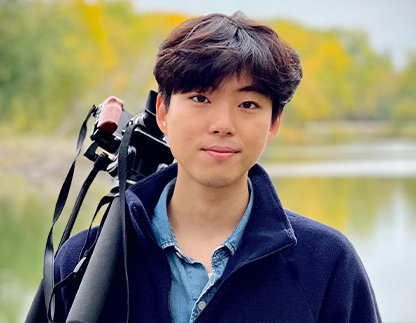I never thought I'd be part of a documentary program—it was challenging at first, but I now feel incredibly appreciative.”
Seunghee Chang
MFA Candidate in Documentary Media

Seunghee Chang is an MFA candidate in Documentary Media in the School of Communication. He works between South Korea and the U.S. as a filmmaker and writer, and his films have been screened in over 25 international film festivals. His documentary, The Beauty of Other Things, which premiered at the 77th Korean Psychological Association Annual Symposium, explores the Han River as a site of grief from a suicide survivor’s perspective. As an undergraduate, Seunghee earned the notable Kwanjeong Scholarship and was honored with the Burton and Karol Lefkowitz Prize.
How would you describe your research and/or work to a non-academic audience?
I am a filmmaker who works between Korea and the U.S. My recent work involves stories around memory, blindness, and the ways people cope with loss.
What have been some of the most memorable twists and turns of your career?
Attending Northwestern's Documentary Media program was a big turn. In undergrad, I was more familiar with making and writing narrative fiction films. There were definitely up-and-downs in adjusting to a new way of thinking about film as I moved into a new program. I never thought I'd be part of a documentary program—it was challenging at first, but I now feel incredibly appreciative.
Why Northwestern?
I remember this being a question I had to answer for undergrad. I don't think I knew at all about what I was talking about back then. My new answer is: a film department I really love, Lake Michigan and its pink sunset, how crowded the libraries get, how the students have access to a lot of great museums in Chicago, the free food that sporadically appears on campus, and all the cute bunny cubs that run around during Spring Quarter.
What did you originally want to be when you grew up?
I wanted to become a filmmaker since my childhood. I grew up with Star Wars, and always tried to recreate and mimic these blockbuster movies with my friends, using our toy lightsabers and imagining that certain parts around our houses were planets. At some point, I made the decision that it would also be fun to make my own films about the things I want to recreate.
Tell us about a current achievement or something you're working on that excites you.
I am currently working on my graduate thesis. Based loosely on a Renaissance poem, the film is set in the Han river in Korea. The river is viewed through the perspective of a blind man who navigates through the environment and its hidden memories with a GoPro camera and a flashlight. I did not know what the film was going to become during pre-production, and now, even after finishing principal photography, I am still looking for answers. I wonder what kind of film it'll be. I worked with wonderful people on the project. My dad also served as its cinematographer.
Tell us about a time when things did not go as you planned, what did you learn?
There was a period of time when I stressed myself out by being overly critical of my own films, regretting certain artistic aspects that no longer can be reversed and doubting many decisions that went into the work. One time, I was preparing for an important project and I almost had to abort it because I was getting so anxious and stressed about it. It was then when I grew thankful that I had the opportunity to make and finish my past films. I thought about all the talented people with whom I had the privilege to work with on these projects. Now I embrace, accept, and value my films, a collective effort, much more than before.
Publish Date: October 29, 2024
If you know a graduate student, postdoctoral scholar, graduate faculty member, staff member, or a member of our TGS alumni population who would make a great candidate for our TGS Spotlight Series, please complete this brief TGS Spotlight Series Nomination Form.